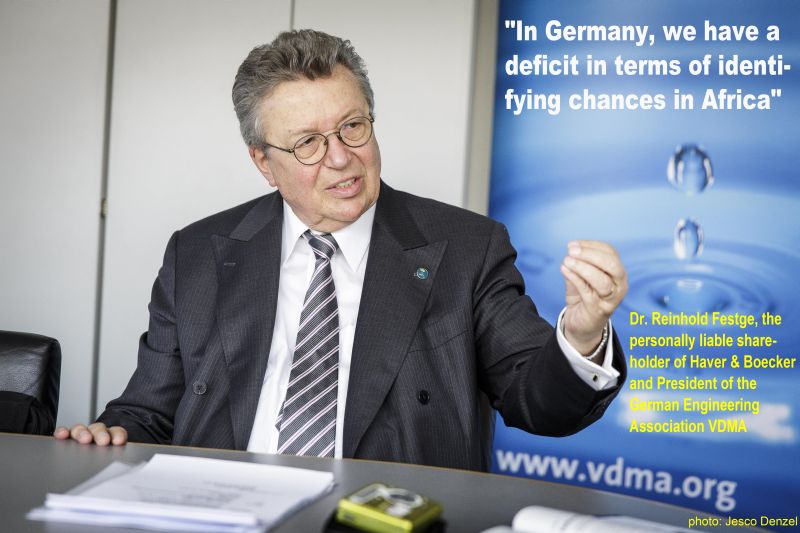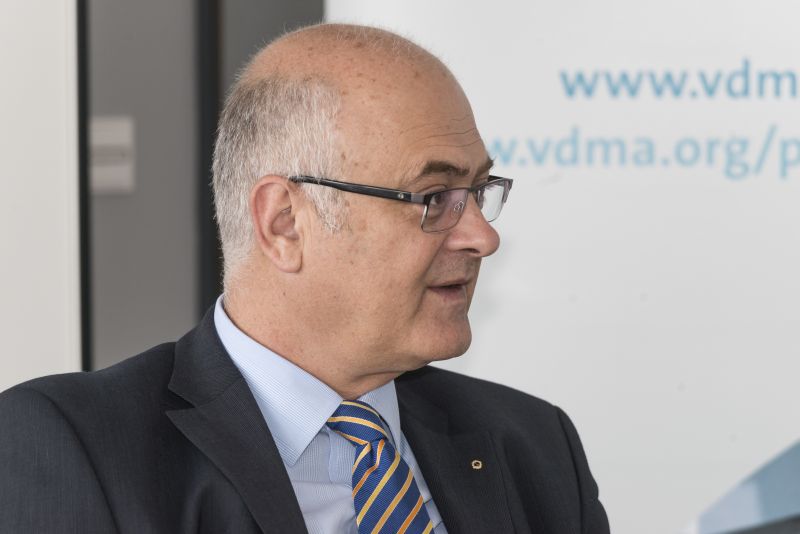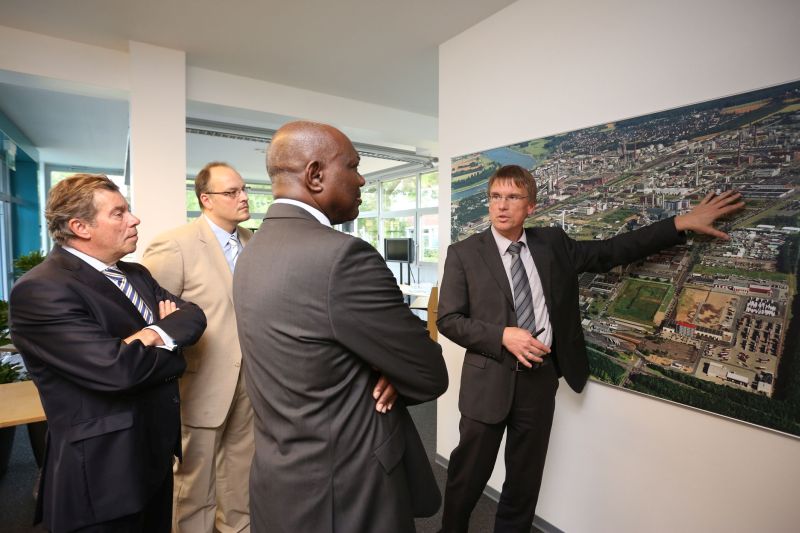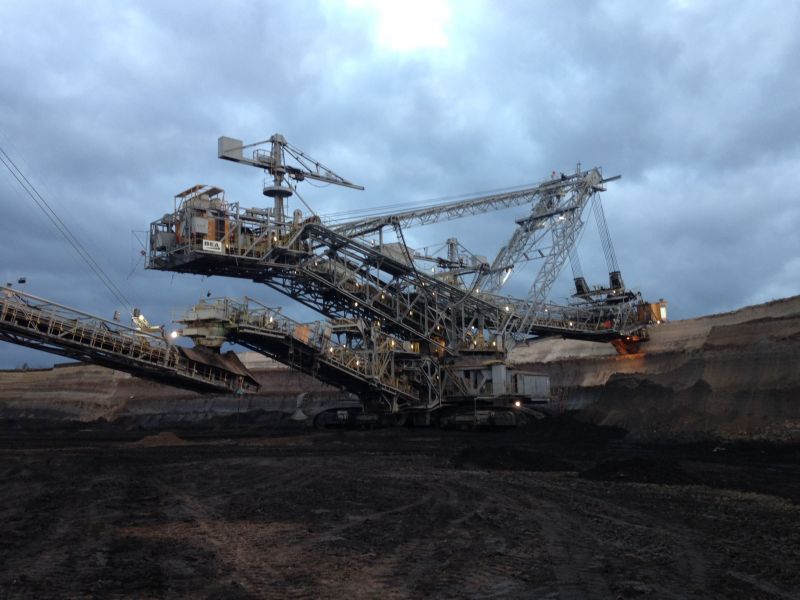2nd part of the interview with Dr. Reinhold Festge
On 17 March 2015, the "Africa meets Business" Day in Berlin, we talked to Dr. Reinhold Festge, the personally liable shareholder of Haver & Boecker and President of the German Engineering Association VDMA.

The VDMA supports German business in Africa. What can you do to lead Hermes to support the commitment of German medium-sized enterprises in Africa?
Dr. Festge: We at VDMA know that medium-sized enterprises want to get involved in Africa. Many companies are already established in Africa, and many companies are interested in going to Africa. The problem is: The industry wants to enter the market, but politicians say that many African countries have a poor rating. Therefore we will not provide financing, as we fear that the money will then be lost. Meanwhile we have employed great efforts of persuasion vis-à-vis politicians. We told them that we must give enhanced attention to Africa as a Continent. Thereupon the decision was made in Berlin, six weeks ago, that Hermes shall again cover transactions with Africa. But according to the information furnished to us, such cover only refers to projects organized by the government. Hermes says, you can be given coverage, if the order is placed by the government of the country concerned.
Thus not by the private industry, but rather by the governments?
Dr. Festge: Yes, and that is actually exactly what we did not want to achieve. Because we know that governments might be particularly problematic. Our request to politicians is still our appeal that more Person to Person or Business to Business transactions shall be made available. While there is no real conflict between the spheres of economy and the Federal Government, as always things are not moving fast enough from the industry's point of view.
But there are African countries with a relatively sound economic base.
Dr. Festge: After all, such circumstances are individually assessed by the Federal Government and by the Hermes Committee. There are different ratings for all intents and purposes, just as there are different countries. And we gained utmost different experience with the individual countries. I myself look back on very positive experiences. We do business in Nigeria for 15 years now, and we never made use of any coverage. At Haver & Boecker we believe in mutual trust, and this trust has so far always been met and justified. We have customers, with whom we work in trustful and friendly cooperation.
And now, machines from Haver & Boecker can also be found in Senegal?
Dr. Festge: Yes, we now support the project of Dangote in Senegal. His cement plant established there has been in operation since December 2014. It is a very good enterprise with a daily production of 3.000 tons, the equivalent of 1.5 million tons produced per year. Hence, we are talking about a rather small cement plant.
There are two further cement plants in Senegal.
Dr. Festge: Yes, one needs to know the volume of production which is suited to that country. We delivered three rotating packing machines, eight spouts and the manual bag loading machines to Senegal. The delivery was conducted through Sinoma, and the plant is located in the city Pout.
However, the plant has a problem with the environmentalists and the farmers.
Dr. Festge: I am not informed about such circumstances.
The plant is said to pump out the groundwater for the purpose of cooling its machines.
Dr. Festge: I cannot imagine such a thing. Normally no water is used in the production process for cement. What you need is heat, thus around 450 degrees in the kiln. But you do not need any cooling water.
How long have you been working in Africa already?
Dr. Festge: Haver & Boecker have been working in Africa for 60 years now. We sell our products in Africa and have always made good experience. We have no problems there.
There are, however, other types of financing in Africa, such as the MCA (Millenium Challenge Account) from the USA. Many African countries have utilized the American financing for the expansion of their structural projects. In Senegal, the MCA amounted to 540 million US-Dollars, and not a single German company was involved, but only French, Spanish and Portuguese enterprises, although the funding was secure. Is there a lack of information in that respect?
Dr. Festge: That might be correct. In Germany, we have a deficit in terms of identifying chances in Africa. This is precisely our problem. We know that in some cases we are too late, and in some cases we lag behind the trend. Maybe we are also a bit anxious. The Germans are no longer as brave as they were 30 or 40 years ago.
What is the reason for this?
Dr. Festge: We are doing too well.
Then you stay in Germany or what?
Dr.Festge: The markets are currently well positioned for the Germans. And people say that the African market is difficult. Africa means more than 50 countries, 1200 languages with big cultural differences. I myself feel that way, too. When I come to Africa - and as you know I often fly to Nigeria -, then I always learn something new.
But the situation is different from country to country.
Dr. Festge: We must therefore get to know us better. It is the task of the VDMA to contribute to this process.
That is our task as well. We are therefore dedicated to a greater commitment of the German industry in Senegal. We have maintained contacts with Mr. Richard Clemens from VDMA for two years now, and in addition to these first steps we wish to extend existing contacts with you.
Dr.Festge: This is what we will do. Hence, the Trade Association for packing machines and foodstuffs machinery, with Mr. Clemens as Managing Director, is the most active Trade Association of VDMA in Africa. We already made good progress in Kenya; in Nigeria and Botswana we are now in the process of gaining a stronger foothold.

And what about the more than 50 other African countries?
Dr. Festge: We are aware of our deficits. This in particular applies to the Francophone African countries. At Haver & Boecker we have drawn the consequence and will in future deal with the Francophone countries through our subsidiary in France. The employees of our French subsidiary are pleased to travel to Africa, where they know their way around. Right now we prepare a decision, so as to serve the French-African market from France and the Portuguese-African market from Brazil. The African market is thus a monumental task. It is not possible to manage this challenging job overnight. But we seriously approach this task. The VDMA will actively campaign for that.
Do we need more "Pro Africa" in German politics?
Dr. Festge: We absolutely need more "Pro Africa" in politics. That is fully clear. However, we need occasions for that purpose - for instance the visit of an Ambassador or a State President. Let us be clear here: Whenever I see a chance of pushing Africa forwards, we certainly do it.
We are happy to show what we do in Africa, similar to the example of Dangote. We spoke with him on the subject 'training in Africa' and published that interview in the VDMA News. We definitely realize that all African countries made efforts - through their Embassies - here in Berlin, to arouse Germany's interest and to invite the German industry to show a greater commitment. But I hope that these Ambassadors become a bit more fond of travelling within Germany.
Because we want them to understand how we work. This will only be possible, if we can exhibit concrete actions in our company. When an Ambassador has come to my company, he knows who we are at Haver & Boecker.

Let us come to the cooperation between VDMA and SenGermany, and the event "Africa meets Business" (17 March 2015) in Berlin. We also aim to achieve a situation where such events will not only take place in Berlin.
Dr. Festge: We must see from the German side what makes sense. If my information is correct, mining operations are also existent in Senegal.
Above all, phosphate and gold mining …
Dr. Festge: When it comes to the mining industry, we have the best university dealing with mining in Freiberg/Saxony. It would be a good opportunity to organize a mining symposium in Saxony for the entrepreneurs from Senegal.

We see great chances in Africa. There are enormous raw material and energy deposits out there, which allow the African people to invest in infrastructure and economic growth. We Germans may not leave this field to competitors from China, the USA, Italy or France. This is what the VDMA, with me as its President in particular, is working on.
Dr. Festge, thank you very much for the Interview.





